Has anyone else ever looked at the early 2000s and wondered, “WHAT ON EARTH WERE WE THINKING?!” And, no, I am not talking about the fashion choices…
OKAY, I am not ONLY talking about the fashion choices; they were definitely…a vibe.
I imagine it feels similar to Boomers who look at pictures of themselves in the 80s and 90s and realise how much the styles at the time aged them.
And while I DO feel compelled to run for the hills when I see that low rise jeans are back in style (WHY WOULD WE INFLICT THAT UPON OURSELVES AGAIN!?),
AND I can’t fight the urge to tell my 6 year old just how lovely her full eyebrows are (lest she decide to pluck them all away as a teen, only to spend thousands on microneedling to fill them back in as an adult),
it is NOT the part of the early aughts that I look at and wonder what kind of glue we were sniffing.
It was this:
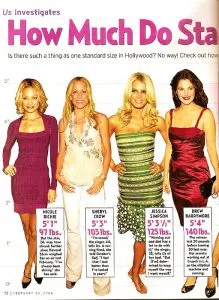
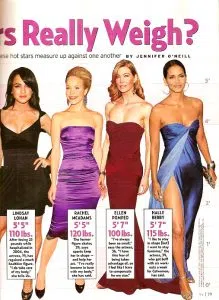
and this:
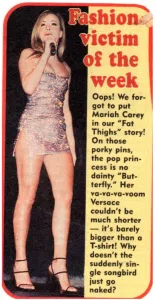
and THIS:
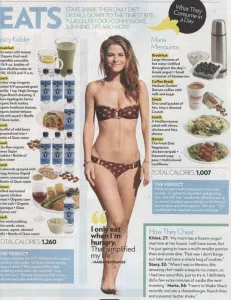
ARE YOU KIDDING ME?!?!!?
It’s wild to look at the body dysmorphia of the 2000s through the therapy filtered eyes of today. Look at this cover of Seventeen magazine, circa 2010.
This is for TEENAGERS!!!
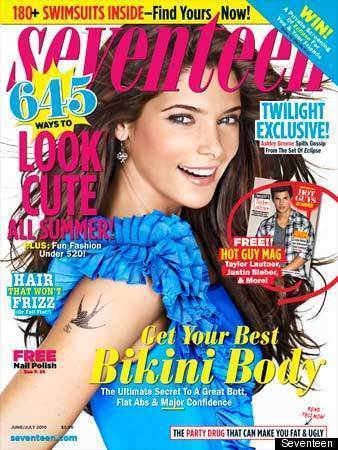
We were DOOMED to suffer a lifetime of body image disorders.
And we came by it naturally; some of my earliest memories involve my mother existing on Ultra Slimfast, and doing the cabbage soup diet.
I can recall, at the age of 17 when I decided to kick my weightloss into high gear and started spending an hour a day on the elliptical machine at my local gym before going to school, my mom telling me that 1250 was the ideal amount of calories each day, with 10% of that coming from fat. 10%?!?!? 12 grams of fat a day!??!
This morning, I had 12 grams of fat JUST AT BREAKFAST.
But this was GOSPEL to me – and it was for her too, because of articles like this:
In 2021, editor Lucy Huber tweeted,
“If any Gen Z are wondering why every Millennial woman has an eating disorder it’s because in the 2000s a normal thing to say to a teenage girl was ‘when you think you feel hungry, you’re actually thirsty so just drink water and you’ll be fine.’”
At the age of 41 now, I am the same weight I was at 17 when I thought I was ‘fat’.
I am the same weight I was when I skipped a University formal because I didn’t like how I looked in my dress, and parked in a lot near my house – with my formal dress on and hair and makeup done – and ate 3 dozen donuts while listening to the radio. I went home a few hours later, and lied to my parents about how the formal was.
I am the same weight when I made up excuse after excuse to avoid wearing a bathing suit in public – I even broke up with a boyfriend so I wouldn’t have to go to his pool party – because I didn’t look like Jessica Alba in Never Been Kissed:
And while I am getting closer and closer to the DGAF age, I still find myself battling with that image of ‘hotness’ that my formative years told me I needed to be. The long, lean, blonde, girl next door who is effortlessly beautiful.
And as a 5’2″ brunette with perma-cankles, I am NEVER going to look like this woman.
And I understand NOW that that is okay.
But I WISH I could go back to my teenage self and tell her that. I wish I could stop her from trying to seek validation in damaging ways.
I wish I could tell her that the person she is is unique and weird and that is a good thing; you don’t WANT to be like everyone else.
I wish I could empower her to embrace all the parts of herself – inside and out – so that she could own who she is.
I wish it didn’t take her 30+ years to figure that out.
AND, I wish that – in spite of knowing what we know now – in spite of going through heroin chic, and slimfast, and extreme makeover, and the biggest loser, and thinspo, and decades of magazines telling us our value was a direct result of our caloric intake – the next generation wasn’t perpetuating the idea in A NEW version of the same old sh*t: Fitness Influencer Culture.
While the fitness community has DEFINITELY helped us shift from a “stay skinny” mentality to encouraging women to build muscle, NOW we’ve just created a new ideal of unattainable beauty. Honestly, if I see one more 20 year old fitness influencer with washboard abs and a bubble butt tell me that ‘all it takes is 15 minutes a day’, I’m going to lose it.
Once again, a lack of transparency is distorting young women’s expectations of what is achievable and impacting their body image as a result.
At the end of the day, we’re still looking at an UNREALISTIC ideal that involves experiencing a transformation, going to extremes, and chasing a specific aesthetic that that really just re-packages the same toxic body standards that have shaped beauty ideals for decades.










